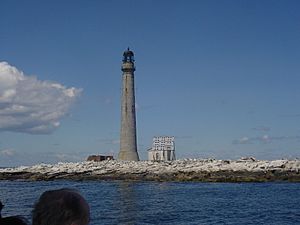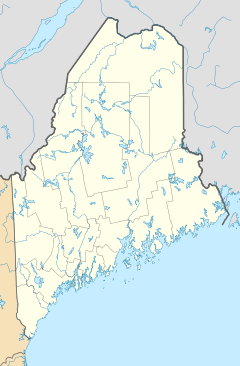Boon Island Light facts for kids
 |
|
|
|
|
| Location | Boon Island off York beach |
|---|---|
| Coordinates | 43°7′17.218″N 70°28′35.119″W / 43.12144944°N 70.47642194°W |
| Year first constructed | 1811 |
| Year first lit | 1855 (current tower) |
| Automated | 1980 |
| Foundation | Surface rock |
| Construction | Granite |
| Tower shape | Gray conical tower connected to building |
| Focal height | 137 feet (42 m) |
| Original lens | Second order Fresnel lens |
| Current lens | VRB-25 |
| Range | 19 nautical miles (35 km; 22 mi) |
| Characteristic | Flashing white 5s |
| Fog signal | HORN: 1 every 10s |
| Admiralty number | J0228 |
| ARLHS number | USA-071 |
| USCG number | 1-155 |
The Boon Island Light is a famous lighthouse located on Boon Island. This island is a small, rocky spot about 300-by-700-foot (91 m × 213 m) in size. It sits off the southern coast of Maine, United States, near Cape Neddick.
Boon Island Light is special because it is the tallest lighthouse in both Maine and New England. It stands 133 feet (41 m) tall. The light itself shines from 137 feet (42 m) above the average high water mark. Its bright beacon flashes white every 5 seconds, helping ships navigate safely.
Contents
History of Boon Island Light
Early Attempts and First Towers
People started talking about building a lighthouse on Boon Island way back in 1710. This was after a ship called the Nottingham Galley got stuck on the island's rocks. The crew faced very tough times before they were rescued.
In 1799, a simple day marker and a 50 feet (15 m) wooden tower were put on the island. But this first tower was washed away by storms within five years. A stone day beacon was built to replace it.
In 1811, the site became a full light station. A new tower made of granite was built. However, this tower also fell victim to a big storm in 1832 and was washed away.
The Current Lighthouse
The lighthouse you see today was built in 1855. It is a 133 feet (41 m) tall, round tower made of brown granite. When it was first built, it had a special Fresnel lens to make its light shine far. At that time, it was the tallest lighthouse in all of New England. A new home for the lighthouse keepers was also built then.
President James Madison approved the building of Boon Island Lighthouse during the War of 1812. The current gray granite tower stands 133 feet (41 m) above the water. It is about 6.2 nautical miles (11.5 km; 7.1 mi) off the coast of Maine.
Because Boon Island is very flat and surrounded by rocks, the lighthouse sometimes looks like it's rising straight out of the sea. This is especially true when low clouds are around. It is one of the most lonely and dangerous lighthouse stations off the Maine coast.
Automation and Modern Use
Boon Island Light was badly damaged during a huge snowstorm in 1978. Some of the stones from the tower were washed into the sea. All the homes and other buildings for the keepers on the island were also destroyed.
Because of this damage, the lighthouse was automated in 1980. This means it no longer needed keepers living there. The United States Coast Guard installed a solar-powered light. The lighthouse is still active today and is managed by the Coast Guard. The lighthouse building itself is leased to the American Lighthouse Foundation.
On March 14, 1988, Boon Island Light Station was added to the National Register of Historic Places. This means it is recognized as an important historical site. In 2014, a person from Portland, Maine, named Art Girard, bought the lighthouse.
Stories and Legends
A Keeper's Struggle
There's a famous story about the keepers of Boon Island Light. Once, they were stuck on the island for several weeks because of bad storms. Their food supplies ran very low, and they were close to starvation. Just when things seemed hopeless, a boat appeared. The keepers sent a message in a bottle asking for help.
A passing ship found the message. It waited until the sea calmed down. Then, the crew put some food in a barrel and floated it towards the island. The barrel drifted right into a small cove. The sea then bounced it onto the bank, keeping it safe from the waves. This food helped the keepers survive until they could get more supplies from the village of York.
The Lonely Keeper's Wife
Another story from the 1800s tells of a lighthouse keeper who died while on the island. His wife was left alone to take care of the lighthouse. She kept the light burning, but the loneliness and isolation eventually made her very unwell. She was later found wandering the island by a rescue ship.
Viewing the Lighthouse
Boon Island Light is not open for people to visit inside. The only ways to see the tower are by boat or by aircraft.
Images for kids
 | Calvin Brent |
 | Walter T. Bailey |
 | Martha Cassell Thompson |
 | Alberta Jeannette Cassell |




